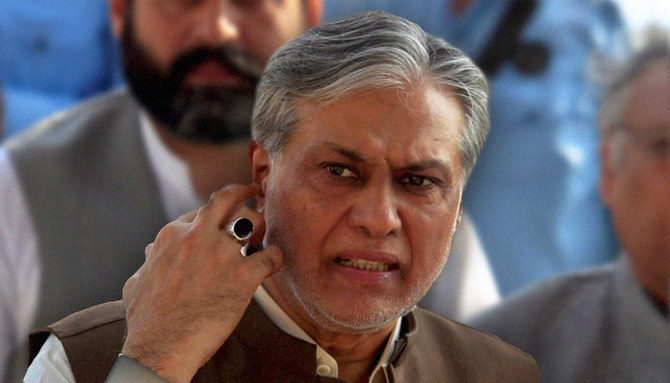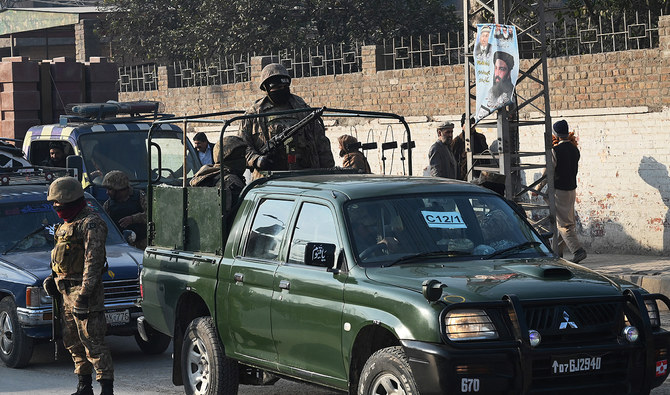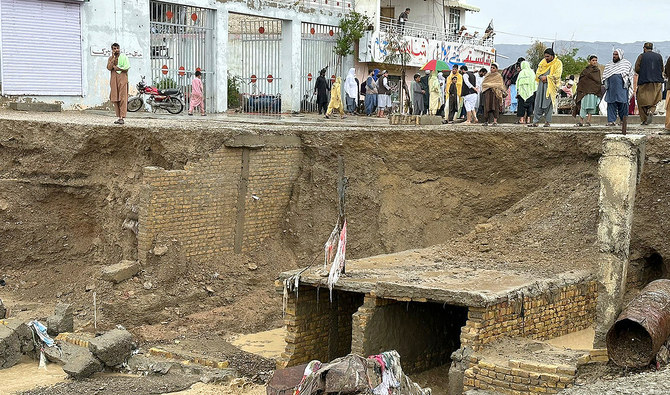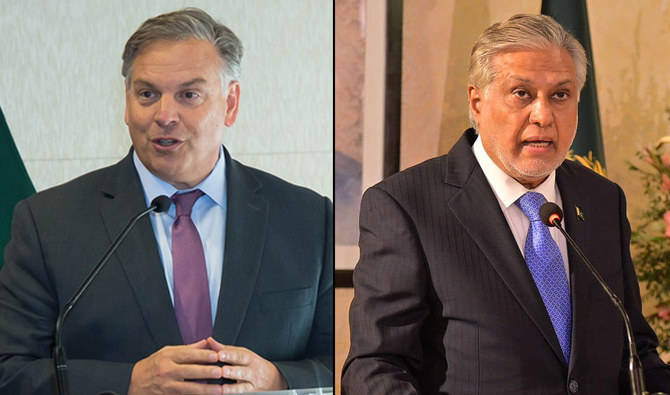ISLAMABAD: Former Pakistani finance minister Ishaq Dar has said he does not expect justice from the Supreme Court of Pakistan in a case alleging he amassed wealth beyond his known sources of income, as the country’s government has stepped up efforts to seek his extradition from the United Kingdom where he has lived since October 2017.
In September 2017, a National Accountability Bureau (NAB) court indicted Dar for having wealth beyond his known sources of income. Dar has denied the charges, saying the case is a political vendetta engineered by opposition leaders and some members of a Supreme Court-appointed joint investigation team (JIT) that probed the matter.
A month after his indictment, the former finance minister left for Tajikistan to participate in an official conference but instead of returning to Pakistan, he flew to Jeddah, Saudi Arabia, where he reportedly fell ill, traveling onwards to London for treatment where he has lived since.
In an exclusive interview with Arab News this week, Dar said he would not return to Pakistan until treatment for cervical problems had concluded and he was sure the courts would rule justly in his case.
“What justice I should expect from these courts,” he said when asked if he had faith in the Chief Justice Asif Saeed Khosa-led Supreme Court.
The former finance minister said the ‘assets beyond means’ case against him was based on a “mala fide” report by the joint investigation team that had said Dar had not filed tax returns for 20 years between 1981 and 2001. He said his returns, filed over 35 years with the Federal Board of Revenue (FBR), Pakistan’s chief tax collection body, were available to the Supreme Court and could be verified, which the apex court had not done.
In an anti-corruption court hearing last month, the head of the JIT admitted that the team had not verified the taxable income of the former finance minister and only examined documents that it had received from investigation agencies.
However, despite these admissions, the finance minister said, the courts were still pursuing the case.
In Pakistan, the Supreme Court has routinely used “suo motu” provisions in the law to open cases on its own initiative, putting its stamp on wide swathes of public life and denouncing the failure of public institutions.
Why, Dar asked, had the apex court not intervened in his case?
“It was their primary responsibility, being the apex court, to have called the FBR and confronted them … wasn’t this the least required duty of the judges?” Dar said, adding that the court should ask FBR for verified documents of his filed tax returns and subsequently “have the courage to reverse this case and withdraw this reference.”
“In the judicial system the subversion of justice is a very serious crime,” he said.
The former finance minister also questioned the Supreme Court’s decision to include two members of the country’s military intelligence agencies as part of the six-person JIT team.
Although the military has carefully distanced itself from the proceedings, the team’s composition had fueled rumors that Pakistan’s powerful generals had a hidden hand in the probe.
Dar was credited with steering Pakistan’s economy to a sounder footing following a 2013 balance of payments crisis but critics say his reluctance to let the rupee weaken to ease current account pressures was symptomatic of a government making economic decisions with one eye on the next general election, which was held mid-2018.
Dar denies this and criticizes the current government of Prime Minister Imran Khan which came to power in August 2018 and under whose watch the rupee has lost a third of its value as part of a steady decline following a bailout agreement with the International Monetary Fund that comes with strict conditions, including a “market determined” exchange rate.
“You have to be sensible to deal with your own matters and not depend on foreign advice which is flawed sometimes,” Dar said. “I have often told international organizations that you have ruined many countries’ economies.”
In January this year, a Supreme Court bench started hearing a petition to bring Dar back to Pakistan and last week, Pakistani media reported that the United Kingdom and Pakistan had signed a memorandum of understanding on May 24 for Dar’s extradition.
“MoU is not an agreement; there is a huge gap between an MoU and reaching a final understanding,” Dar said when asked if he thought his extradition was a real possibility.
“The judicial process cannot be influenced by the executive here, in this country [the UK] ... like our country [Pakistan],” Dar said. “This [UK] is not a banana republic, the judicial system is very strong, due process is very strong, so that’s why they won’t be able to Inshallah [God willing] achieve their wish [of extradition] any time.”
He said even if the UK government did agree to the Pakistani request to initiate the extradition process, the Pakistan government would first have to prove that the case against Dar was not politically motivated.
“The UK government, I hope and expect, that they would not trigger the judicial process and they will understand that this is a political motivated case, this is political victimization, persecution of a person who was four times finance minister of Pakistan,” Dar said. “The government of Pakistan will have to establish their bona fide case [if they pursue extradition] … Everything is accounted for, I have all the evidence. So they will have a very embarrassing situation.”
Responding to conflicting reports that he had applied for political asylum in the UK, Dar said he had entered the UK on a visa that was valid until 2020, but the Pakistani government had canceled his passport last September. He had informed the UK authorities about this development, he said, but had not “heard from them since long.”
“I have informed the Home Office that my passport has been canceled, I’m virtually stateless and a refugee,” Dar said. “I have left it to my attorneys to deal with [this situation] in any appropriate manner that makes me stay in the UK legally … whatever is the legal way to stay here till I see justice in Pakistan and I get my medical treatment completed.”
Former finance minister Dar says doesn’t expect justice from Pakistan Supreme Court
Former finance minister Dar says doesn’t expect justice from Pakistan Supreme Court

- “I’m virtually stateless and a refugee,” former finance minister says when asked if he had applied for asylum
- Dar has denied all charges in ‘assets beyond means’ case saying it is a political vendetta engineered by his opponents
Rain wipes out first Pakistan-New Zealand T20 after just two balls

- Fast bowler Mohammad Amir returned to international cricket after nearly four years
- Having come out of retirement last month, Amir’s participation was limited to just fielding
RAWALPINDI: Heavy rain caused the first Twenty20 international between Pakistan and New Zealand to be abandoned after just two deliveries in Rawalpindi on Thursday.
New Zealand skipper Michael Bracewell won the toss, which had also been delayed by 30 minutes, and opted to bat but no action was possible for two-and-a-half hours.
Umpires Ahsan Raza and Aleem Dar then announced a five-over-a-side game at 10:10 local time (9:10 GMT).
Pakistan paceman Shaheen Shah Afridi conceded two leg-byes to debutant Tim Robinson off the first ball before bowling the batsman with a sharp delivery off the next.
But as soon as the Pakistan fielders started celebrating the wicket, the rain returned to force an abandonment.
Fast bowler Mohammad Amir returned to international cricket after nearly four years, having come out of retirement last month, but his participation was limited to just fielding.
The 32-year-old retired in December 2020 after being dropped from the side but changed his mind last month and decided to restart his career, which had already been stalled by a match-fixing ban in 2010.
Pakistan handed T20I caps to batsman Usman Khan, spinner Abrar Ahmed and all-rounder Muhammad Irfan Khan, while Robinson debuted for New Zealand.
The remaining matches are in Rawalpindi on April 20 and 21 and in Lahore on April 25 and 27.
The series gives a chance to both teams to test their bench strength ahead of the Twenty20 World Cup to be held in June in the United States and the West Indies.
New Zealand are without nine key players, including skipper Kane Williamson, who are playing in the ongoing Indian Premier League.
Five custom officials among six killed in gun attack in northwest Pakistan

- Officials of the custom department attacked while on routine patrol in Dera Ismail Khan
- Latest killings come amid renewed violence in northwestern and southwestern regions
PESHAWAR: Six people, including five officials of the customs department, were killed and another wounded on Thursday when gunmen opened fire on their vehicle in the northwestern Khyber Pakhtunkhwa province, police and rescue officials said.
Officials of the custom department were out for routine patrol in Dera Ismail Khan city when their vehicle came under attack in the jurisdiction of Draban Police Station, Regional Police Officer Nasir Hussain Satti told Arab News.
“As terrorists started firing on the custom officials, the driver lost control of the vehicle,” Hussain said.
“As a result, their car collided head-on with another vehicle coming from the opposite direction, leaving five officials and a girl dead on the spot while one person suffered injuries.”
KP Chief Minister Ali Amin Gandapur condemned the incident.
“The incident is extremely tragic. Police should take all measures to arrest elements behind the attack,” a statement quoting the chief minister said.
Aziz Dotani, a spokesman at DI Khan district’s Rescue 1122 service, said a relief team promptly rushed to the area to transport bodies to the nearest medical facility.
The latest killings come at a time of renewed militant violence in Pakistan’s northwestern and southwestern regions, especially after the banned Tehreek-e-Taliban Pakistan (TTP) called off its fragile, months-long truce with the government in November 2022.
While there has been a spike in militant attacks across the northwest and southwest of the country, militants have particularly attacked policemen in Khyber Pakhtunkhwa in recent weeks.
Earlier this month, unidentified gunmen shot dead a policeman in the restive North Waziristan tribal district. Separately, an official working with the provincial counterterrorism department and a senior cleric affiliated with the Jamiat Ulema Islam religious political party were shot dead in two separate incidents of “targeted killings” in the North Waziristan tribal district, according to police.
While no group immediately claimed responsibility for the latest killings, suspicion is likely to fall on the TTP, which has had a significant presence in KP before being driven out as a result of successive military operations over the years. Pakistan says the TTP is now mostly based in hideouts in neighboring Afghanistan, which the Taliban denies.
Last month, seven Pakistani soldiers, including two army officers, were killed in a militant attack in North Waziristan, according to the Pakistani military. The attack led the Pakistani military to carry out rare airstrikes against suspected TTP hideouts inside Afghanistan on March 18, killing eight people. The strikes prompted Afghan forces to fire back at Pakistani soldiers along the border.
Afghan Deputy Interior Minister Mohammad Nabi Omari has urged Pakistan and the banned TTP to start negotiations afresh but Pakistan has rejected the Afghan minister’s suggestion, urging Kabul to take action against militant groups operating from its soil.
Both Pakistan and Afghanistan have traded blame in recent months over who is responsible for the recent spate of militant attacks in Pakistan.
Islamabad says the attacks are launched mostly by TTP members who operate from safe havens in Afghanistan. Kabul denies this and blames Islamabad for not being able to handle its own security challenges.
Seven killed in southwest Pakistan as heavy rains continue to wreak havoc nationwide

- At least 33 people killed and 46 injured in various rain-related incidents in northwestern Pakistan
- Pakistan is ranked fifth most vulnerable country to climate change according to Global Climate Risk Index
QUETTA: Seven people including a woman were killed in southwestern Pakistan as rains continue to wreak havoc in the South Asian nation ranked as the fifth most vulnerable country to climate change according to the Global Climate Risk Index.
Heavy rains in the last three weeks have triggered landslides and flash floods in several parts of Pakistan.
On Thursday, seven people were killed in the southwestern Balochistan province, officials in the town of Chaman here the deaths took place said.
“In the first incident a car drove into flood waters in Mashan Talab situated on the outskirts of Chaman,” Deputy Commissioner Chaman Raja Atthar Abbas told Arab News.
“Five men sitting inside the vehicle drowned in flood water while two people including a woman were killed after a mud wall fell on them on College road.”
Torrential rains had caused “severe damage” in Chaman and its surrounding areas as dozens of mud house collapsed in the last two days of rains, Abbas added.
Separately, at least 33 people were killed and another 46 injured in various rain-related incidents in Pakistan’s northwestern Khyber Pakhtunkhwa (KP) province in the last six days, the Provincial Disaster Management Authority (PDMA) said on Thursday.
Rains that began last Friday had completely destroyed 336 houses and partially damaged another 1,606 in different districts across the province, according to the PDMA.
The incidents occurred in Khyber, Upper and Lower Dir, Upper and Lower Chitral, Swat, Bajaur, Shangla, Karak, Tank, Mardan, Peshawar, Charsadda, Hangu, Battagram, Dera Ismail Khan and other districts.
“The deceased include 17 children, eight men, eight women, while the injured included 32 men, six women and eight children,” the PDMA said in its daily situation report on Thursday.
On Wednesday, the authority had warned of another spell of heavy rains in the province from April 17 till April 21, which could trigger landslides and flash floods.
In 2022, downpours swelled rivers and at one point flooded a third of Pakistan, killing 1,739 people. The floods also caused $30 billion in damages, from which Pakistan is still trying to rebuild.
Amir returns to international cricket as New Zealand bat in first T20I

- Amir retired in December 2020 after being dropped from the side but changed his mind last month
- Fast bowler decided to restart his career, which had also been stalled by a match-fixing ban in 2010
RAWALPINDI: Pakistan fast bowler Mohammad Amir returns to international cricket from an absence of almost four years after New Zealand won the toss in their rain-delayed first Twenty20 in Rawalpindi on Thursday.
The 32-year-old retired in December 2020 after being dropped from the side but changed his mind last month and decided to restart his career, which had also been stalled by a match-fixing ban in 2010.
Pakistan have handed T20I debuts to batter Usman Khan, spinner Abrar Ahmed and allrounder Muhammad Irfan Khan to gauge their bench strength ahead of June’s World Cup in the United States and the West Indies.
New Zealand, missing nine players due to the Indian Premier League, handed a T20I debut to batter Tim Robinson.
The remaining matches are in Rawalpindi on April 20 and 21 and in Lahore on April 25 and 27.
Teams:
Pakistan: Babar Azam (captain), Usman Khan, Abrar Ahmed, Iftikhar Ahmed, Mohammad Rizwan, Mohammad Amir, Muhammad Irfan Khan, Naseem Shah, Saim Ayub, Shadab Khan, Shaheen Shah Afridi
New Zealand: Michael Bracewell (captain), Mark Chapman, Josh Clarkson, Jacob Duffy, Dean Foxcroft, Ben Lister, Jimmy Neesham, Tim Robinson, Ben Sears, Tim Seifert, Ish Sodhi
Umpires: Ahsan Raza (PAK) and Aleem Dar (PAK)
Tv umpire: Faisal Afridi (PAK)
Match referee: Andy Pycroft (ZIM)
US says Pakistan’s prosperity and security remains a ‘top priority’

- Blome’s comments come amid a spike in militant attacks in Pakistan
- Pakistani finance chief has launched negotiations for a new IMF bailout
KARACHI: US Ambassador Donald Blome met Pakistani Foreign Minister Ishaq Dar on Thursday and said the South Asian nation’s prosperity and security remained a ‘top priority’ for Washington.
Blome’s comments come amid a spike in militant attacks in Pakistan and while its finance chief is in discussions with the International Monetary Fund in Washington on a potential follow-up program to its nine-month, $3 billion stand-by arrangement.
“US Ambassador Donald Blome met today with Foreign Minister Ishaq Dar to discuss recent events in the region,” Acting US Mission Spokesperson Thomas Montgomery said.
“Ambassador Blome conveyed the United States’ commitment to working with the government and people of Pakistan, underscoring that prosperity and security for Pakistan remains a top priority for the United States.”
Pakistan went to the polls on February 8 in a vote marred by a mobile Internet shutdown on election day, arrests and violence in its build-up and unusually delayed results, leading to accusations that the vote was rigged.
However, the US has repeatedly said it will work with the new government of Prime Minister Shehbaz Sharif, though it has expressed concerns about reported election irregularities and urged a probe.
Although defense and key foreign policy decisions are largely influenced by Pakistan’s powerful military, Sharif will have to juggle relations with the US and China.
Islamabad has close economic ties to both the nations, which has put it in a tricky position as the two countries have embarked upon a costly trade war.
“From our perspective it has to be an and-and discussion,” finance minister Muhammad Aurangzeb said in an interview this week when asked how the Sharif government plans to conduct its trading relationships with the world’s two largest economies.
“US is our largest trading partner, and it has always supported us, always helped us in terms of the investments,” he said. “So that is always going to be a very, very critical relationship for Pakistan.”
“On the other side, a lot of investment, especially in infrastructure, came through CPEC,” he said, referring to the roughly 1,860-mile-long China-Pakistan Economic Corridor designed to give China access to the Arabian Sea.
Aurangzeb said there was a “very good opportunity” for Pakistan to play a similar role in the trade war as countries like Vietnam, which has been able to dramatically boost its exports to the US following the imposition of tariffs on some Chinese goods.
“We have already a few examples of that already working,” he said. “But what we need to do is to really scale it up.”
Militancy has also spiked in recent months, creating a major challenge for the new government, with religiously motivated groups like the Pakistani Taliban as well as ethnic separatists showing an enhanced ability to hit high-value targets.
In an attack last month that has so far been unclaimed, a suicide bomber rammed a vehicle into a convoy of Chinese engineers working on a hydropower project at Dasu in the northwestern Khyber Pakhtunkhwa province, killing five Chinese nationals and their Pakistani driver.
The Mar. 26 assault was the third major attack in little over a week on China’s interests in the South Asian nation, where Beijing has invested more than $65 billion in infrastructure projects as part of its wider Belt and Road initiative.











